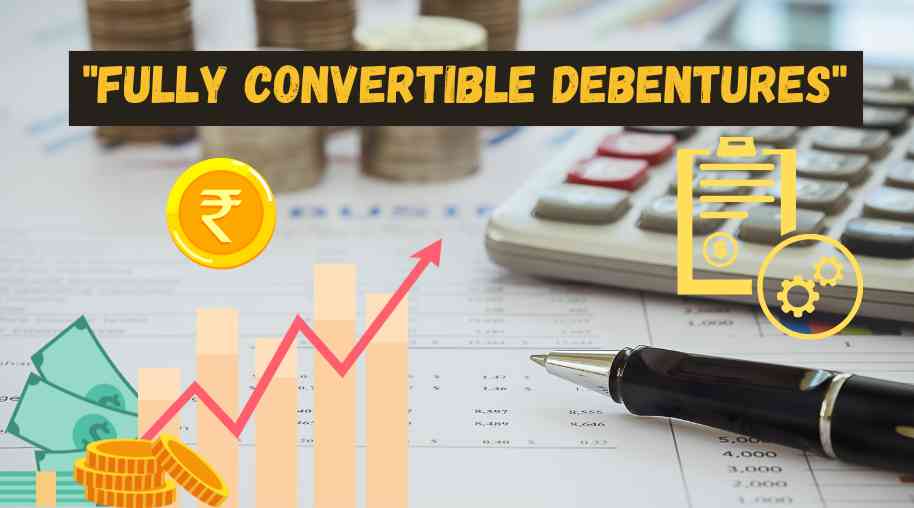FCD Full Form-Fully Convertible Debentures
by Shashi Gaherwar
0 2574
Fully Convertible Debentures (FCDs): A Hybrid Investment for Growth and Stability
Introduction
Fully Convertible Debentures (FCDs) are hybrid financial instruments that begin as debt securities but eventually convert into equity shares of the issuing company. These instruments provide a unique investment opportunity by combining the fixed-income stability of bonds with the growth potential of stocks. Companies often use FCDs as a tool to raise capital while offering investors a chance to become shareholders in the future. This dual nature of FCDs makes them a valuable option for both corporate financing and diversified investing.

What are Fully Convertible Debentures (FCDs)?
Fully Convertible Debentures are corporate bonds that automatically convert into equity shares after a specified period. This conversion is mandatory, distinguishing FCDs from Non-Convertible Debentures (NCDs), which remain as fixed-income instruments throughout their tenure. FCDs offer an initial period of interest earnings, followed by equity participation once the conversion occurs. This transition benefits both issuers—by reducing repayment obligations—and investors—by offering the potential for capital gains.
Key Features of FCDs
- Compulsory Conversion: FCDs mandatorily convert into equity after a fixed duration, eliminating the need for principal repayment.
- Lower Interest Rates: Due to the equity conversion, FCDs typically offer lower interest rates compared to conventional bonds.
- Investor Benefits: Investors receive fixed returns until conversion and gain shareholder rights afterward.
- Liquidity: FCDs are listed on stock exchanges, allowing trading flexibility before conversion.
How FCDs Work
The life cycle of an FCD begins with issuance. Companies issue FCDs to raise capital for purposes such as business expansion, working capital needs, or restructuring existing debt. During the tenure of the bond, investors receive regular interest payments. At the end of this period, the debentures automatically convert into equity shares based on a predetermined conversion ratio. Once this happens, the bondholders become shareholders and gain all rights associated with equity ownership, including participation in dividends and capital appreciation.
Benefits of FCDs
For issuing companies, FCDs offer several strategic advantages:
- Reduced Debt Burden: Conversion into shares eliminates the need for principal repayment.
- Enhanced Market Image: Issuing FCDs portrays the company as growth-oriented.
- Delayed Equity Dilution: Conversion delays the impact on existing shareholders.
From an investor’s perspective, FCDs provide a balanced investment:
- Fixed Income: Interest payments offer a predictable income stream before conversion.
- Capital Growth: Post-conversion, investors benefit from potential stock price increases.
- Lower Risk: The initial income buffer reduces risk compared to direct equity investment.
- Diversification: FCDs blend debt security and equity potential in a portfolio.
Risks and Challenges of FCDs
Despite their benefits, FCDs carry certain risks:
- Equity Dilution: Conversion increases outstanding shares, potentially diluting earnings per share.
- Stock Underperformance: Poor stock performance post-conversion may lead to capital losses.
- Limited Liquidity: Some FCDs may face low trading volumes in the secondary market.
- Lower Interest Rates: FCDs offer lower interest compared to traditional bonds, which may be less attractive.
Comparison with Other Financial Instruments
FCDs differ from other instruments due to their hybrid nature:
- Vs. Non-Convertible Debentures: NCDs require full repayment, while FCDs convert into equity.
- Vs. Equity Shares: Equity offers no fixed income and carries higher market risk, while FCDs provide initial stability.
Role of FCDs in Financial Markets
FCDs play a crucial role in modern financial markets by offering a flexible financing tool. For companies, they provide capital access without immediate dilution or debt repayment. For investors, FCDs offer a structured way to gain equity exposure with reduced upfront risk. They also support economic development by facilitating capital inflow into businesses, enabling growth and innovation.
Fully Convertible Debentures (FCDs) effectively bridge the gap between traditional debt instruments and equity shares, offering an innovative solution for both companies and investors. Their unique structure allows businesses to raise capital without increasing debt burdens, while giving investors a mix of income stability and growth potential. Although FCDs carry risks such as stock market dependency and possible liquidity issues, their advantages in terms of financial flexibility and investment diversification make them a valuable addition to the financial landscape. With informed decision-making and proper risk assessment, FCDs can be a strategic asset for long-term growth.
Further Learning Resources
If you’re passionate about building a successful blogging website, check out this helpful guide at Coding Tag – How to Start a Successful Blog. It offers practical steps and expert tips to kickstart your blogging journey!
For dedicated UPSC exam preparation, we highly recommend visiting www.iasmania.com. It offers well-structured resources, current affairs, and subject-wise notes tailored specifically for aspirants. Start your journey today!

Share:









Comments
Waiting for your comments